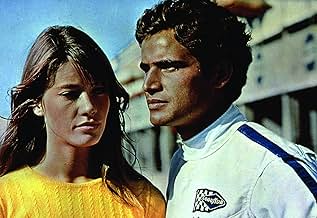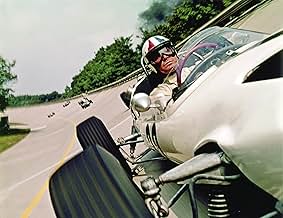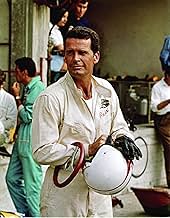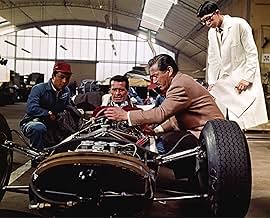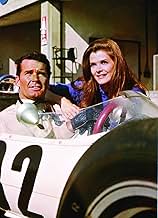American Grand Prix driver Pete Aron is fired by his Jordan-BRM racing team after a crash at Monaco that injures his British teammate, Scott Stoddard.American Grand Prix driver Pete Aron is fired by his Jordan-BRM racing team after a crash at Monaco that injures his British teammate, Scott Stoddard.American Grand Prix driver Pete Aron is fired by his Jordan-BRM racing team after a crash at Monaco that injures his British teammate, Scott Stoddard.
- Won 3 Oscars
- 3 wins & 4 nominations total
- Izo Yamura
- (as Toshiro Mifune)
- Nino Barlini
- (as Antonio Sabàto)
- Monique Delvaux-Sarti
- (as Genevieve Page)
- Wallace Bennett
- (as Donal O'Brien)
- Surgeon
- (as Albert Remy)
Featured reviews
"Titanic" wasn't about that pathetic love triangle story. It was a vehicle to get you into the night the great ship was lost. Grand Prix uses a relatively lame storyline about the private lives of the drivers to get you into their circle. I think it's all just a part of putting the audience into the car.
And I DO mean the car. Not a green screen half car and a CGI effect. A car. Several cars. At high speed, with cameras mounted and actors trained to actually drive them. No phony backgrounds projected. Watch NASCAR or INDY coverage on the SPEED Channel any weekend and you will see on-board shots from vidcams in real time. We're used to that now. Prior to "Grand Prix", there was NO such thing. Grand Prix stands with "Bullitt" and "The French Connection" as the greatest "cut to the chase" movies of all time.
Nothing is done like this any more. If you want to see the masters at work, rent these movies. This is pure analog fun at it's best, and it just doesn't get better with the switch to digits, because the thrill leaves along with the risk factor.
So tolerate the maudlin romantic claptrap. Laugh as you watch some of the stars of Formula 1 racing standing around grimacing into the camera at the infidelities of the British driver's wife (it is a riot), but stand and applaud in awe at the astounding achievement of John Frankenheimer and company at shooting a fictional Grand Prix season against the background of an actual Grand Prix season. It is awesome and worthy of your viewing time, even though the basic story falls short of Oscar caliber scripting.
Well, Frankenheimer did all that back in the 60s and for that reason alone the movie is required watching for anyone who has even a slight interest in cars or motor sports. GP offers us a pretty realistic glimpse of an era gone-by - and it doesn't shy away from the gruesome reality and dangers of motor-racing in the 60s. This realism alone makes GP stand out. The filmmakers didn't simulate races, they actually had the actors racing cars on the original tracks and filmed it. The result is astonishing and really gives a feeling of what it must've been like to sit in one of those beautiful deathtraps at speeds of around 300 km/h. The excellent cinematography, editing and music add to this unique experience and they also give the picture that typical 60s-feel (the opening credits alone are worth the price of admission in my book).
On a side note: Being a racing-fan myself, I can't help but wonder why Frankenheimer didn't include the race at the Nürburgring. Back in those days, F1 still used the 20km+ Nordschleife-version of the track, possibly the most demanding and "scary" circuit ever.
Naturally: Between races the movie loses momentum. That's not so much caused by some weak dialog or the predictable plot - it's s just that those incredible scenes on the tracks simply steal the show. No wonder that I find myself fast-forwarding through a lot of the dialog.
In short: 10/10 for the action on the racetracks - 6/10 for the scenes off the track = 8/10
Grand Prix is a Grand Hotel type film involving several people and their lives over the course of a few months on the European racing circuit. Many of the types fans of the sport will most likely recognize.
James Garner is the American driver who's had a run of bad luck. A car crash has forced him to try and be color commentator for television, a role he can't fit in. Japanese auto industrialist Toshiro Mifune is offering him a way back into the circuit.
Brian Bedford's sustained a serious crash and even before's he's healed he's driving through a lot of pain. His wife Jessica Walter thinks he's certifiable and she drifts into an affair with Garner whom she thinks is showing good sense in going for the life of sports television commentator.
Antonio Sabato, father of the famed Calvin Klein model of the last decade, is the Epicurean live for the moment driver who doesn't take anything seriously except for the time he's actually competing. Definitely not his women as Francoise Hardy finds out.
The veteran of the circuit, the Michael Jordan of the profession, is Yves Montand. The only real happiness he has is driving, not even an affair with journalist Eva Marie Saint is bringing him that. Montand is trapped in a loveless marriage to Genevieve Page who's the daughter of another automobile industrialist. His name means more prestige for daddy's firm, so she'll tolerate all infidelities.
Montand is getting old and like many afraid his reflexes won't be there for him at one critical point too many. Back then these guys were racing at speeds of 180 miles an hour. Your life saving decisions at some point are taken out of your hands at those speeds.
Whether it's the NASCAR circuit in the USA, the Grand Prix of Europe or even midget go cars, auto racing may in fact be the only truly international sport there is. It's stars come from every corner in this world except Antarctica. The sport is held in just about every country there is. It's also never become has politicized as the Olympics have become on occasion. The drivers who compete and the supporters and sponsors around them are an international fraternity that national boundaries have no meaning for.
Despite the presence of so many international names, the star of the film is the sport itself. All the stories of the players are done against that backdrop. It's a tribute to John Frankenheimer that the individual stories did not get lost in the making of Grand Prix. The film won three Oscars, for Sound, for Sound Effects, and for Film Editing.
Grand Prix is the best film on auto racing ever done. And it's presented in such a way that even people who don't follow the sport, can appreciate what the drivers go through. If possible see this one on the big screen.
Going to a Cinerama theater in those days was a big event. You got dressed up. I still have the playbill type program for Grand Prix that you got with your ticket. I also have Maurice Jarres great sound track album as well as an interesting record associated with the movie featuring Formula One engine sounds from Monaco, Spa and Monza with narration by Phil Hill. Great stuff.
Did you know
- TriviaOf the 32 professional racing drivers who participated or were seen in the film, five died in racing accidents within two years and another five in the following ten years.
- GoofsPrior to the start of the race at Monza, there is a flag ceremony at the starting line. The US flag has 48 stars instead of the 50 it should have had in 1966.
- Quotes
Jean-Pierre Sarti: The danger? Well, of course. But you are missing a very important point. I think if any of us imagined - really imagined - what it would be like to go into a tree at 150 miles per hour we would probably never get into the cars at all, none of us. So it has always seemed to me that to do something very dangerous requires a certain absence of imagination.
- ConnectionsEdited into Bass on Titles (1982)
15 Fast and Fun Racing Movies
15 Fast and Fun Racing Movies
- How long is Grand Prix?Powered by Alexa
Details
Box office
- Budget
- $9,000,000 (estimated)
- Runtime2 hours 56 minutes
- Aspect ratio
- 2.20 : 1
Contribute to this page




